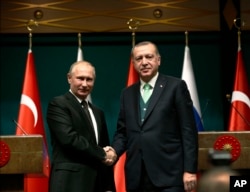Turkey and Russia have signed an accord for Moscow to supply Ankara with S-400 surface-to-air missiles, CNN Turk and other media reported on Friday, finalizing a deal the two countries have been working on for more than a year.
The S-400 deal, reportedly worth about $2.5 billion, has caused concern in the West because Turkey is a member of NATO and the system cannot be integrated into NATO's military architecture.
It is the latest in a series of moves by Ankara to boost its defense capabilities as it faces threats from Kurdish and Islamist militants at home and conflicts across its borders in Syria and Iraq.
No details of the accord were available and officials were not immediately available to comment. But Sergei Chemezov, head of the Russian state conglomerate Rostec, told the Kommersant daily on Wednesday Russia would supply Turkey with four batteries of S-400s under the deal.
He said Moscow was expected to begin the first deliveries in March 2020 and that Turkey was the first NATO member state to acquire the advanced S-400 missile system.
Borrowing ‘in rubles’
Earlier on Friday, Turkish newspapers cited President Recep Tayyip Erdogan as saying Turkey would borrow in the Russian currency in a loan deal under the accord.
"We will not borrow in dollars in this loan, we will borrow in rubles," Hurriyet newspaper quoted Erdogan as telling reporters on his plane, returning from a trip to Africa.
According to Chemezov, Turkey would pay 45 percent of the cost of the agreement up front, with Russia providing loans to cover the remaining 55 percent.
The Russian Finance Ministry will finance a deal from the state treasury, while Russian banks will take part solely in the transfer of funds in the deal, a Russian banking source said.
Relations between Moscow and Ankara deteriorated sharply in 2015 after Turkey shot down a Russian air force jet that it said had crossed into Turkish airspace, but they have since repaired ties despite having backed different sides in the Syrian war. They are now cooperating on Syrian peace efforts as well as projects in the defense industry and energy sectors.
While pushing ahead with the S-400 project, Ankara has sought to secure defense deals with other countries as well.
In November, Turkey signed a letter of intent with France and Italy to strengthen cooperation on joint defense projects.
As a first step, the Franco-Italian EUROSAM consortium and Turkish companies will look into a system based on the SAMP-T missile systems.
Turkey has also invested heavily in the development of its domestic defense industry, with projects encompassing areas including combat helicopters, tanks, drones and warships.






